Ask a Dev: Why do we have a love / hate relationship with boss battles?

I'm going to preface this with a confession: I really, really hate boss battles. They're stressful and difficult and they make my thumbs hurt. Also, I'm not very good at them.
In games that give me the option to be aggressive or friendly, I'll almost always go with the friendly option, because then I don't have to worry about whether I can parry well (spoilers: I don't think I've ever pulled off a successful parry in my life).
But there are dozens of developers out there (hundreds, even) who love boss battles enough to create entire games that focus almost exclusively on taking down oversized and overpowered bad guys.
Cuphead, Titan Souls, Shadow of the Colossus, Evolve – these all distill a game down into taking on a handful of really difficult dudes with very little princess-rescuing, chicken-herding and magical-triangle-collecting to keep you going in-between.
So why do people enjoy boss battles so much? Perhaps it's that feeling of beating the odds, of taking on something much bigger than you and winning. Games usually position us as the someone at the centre of the universe with enough power to save it, but there's a small moment of vulnerability presented to you when faced with a boss – the scales are heavily tipped in favour of the guy with a billion arms and spikes coming out of his eyes.
"The feeling of David versus Goliath is a good one," says Mark Foster, lead designer on Titan Souls. "You're the underdog, so the victory is greater knowing you came from a weaker position."
The feeling of David versus Goliath is a good one. You're the underdog, so the victory is greater knowing you came from a weaker position.
Sign up for breaking news, reviews, opinion, top tech deals, and more.
There's a fine line to tread between a boss that's so big that it's impossible, and a boss that's too easy to beat – and in that golden little segment of design lies a compelling boss battle.
Self-restraint and collaboration keep a boss battle from getting too grandiose or controller-breakingly difficult, but that's not as easy a process as it sounds.
"Designing boss battles could definitely be seen as the boss battle of game development," says Hamish Lockwood, designer at Playtonic, currently making a spiritual successor to Banjo-Kazooie called Yooka-Laylee. "You can easily lose sight of the difficulty. Perhaps the start of a fight isn't working for you so you make a few changes and before you know it, it's more complex and difficult than the last part of the fight."
Making boss battles tough, but not THAT tough
Making things too taxing is an issue that's widespread across game development.
"All the bosses in Titan Souls started out probably twice as hard or fast as they are currently," Foster admits. Game designers know the boss's patterns and weak spots inside-out, so it's easy to get used to the difficulty level sooner than a player would. As with most game design elements, outside perspectives are important.
"You need to do sanity checks often with other team mates," says Foster. "Then reel it back when needed."
Titan Souls does things a little differently to most boss-based games – rather than having a boss that sticks to a pattern or morphs into different forms based on how much damage he's taken, the bosses in Titan Souls require only one hit to be destroyed.
Then again, so does the player – making it a very difficult tango twixt tiny protagonist and the gigantic fists of Gol-Lath.
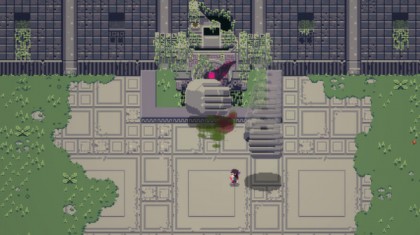
Titan Souls' departure from tradition is emblematic of the change in direction we can see in more recent games. Bosses in older games were usually based on patterns, and usually the rule of three – three separate forms or attack styles, punctuated by short periods of attacking the enemy's weak spot. Think Zelda, Metroid, Mario, Mega Man – games old enough to be inspired by arcade game mechanics, and thus were focused on repetitive, challenging sequences of attacks.
The legacy of arcade games still exists in modern boss battles, but now we have more stuff to play with – 3D combat, increasingly detailed lore and more intricate controllers.
Many modern boss battles have reacted to the tradition of patterns with something unexpected – an enemy that's surprisingly easy to take down, like Deus Ex: Human Revolution's final boss, or Titan Souls' one-hit kill mechanic that goes against the usual "boss with many many hit points" trope.
Adversely, other games have reacted to tradition in a different way – by taking away all the gimmicks and novelty away and returning to the focus of a boss battle: the combat. Foster's favourite boss battle – Artorias the Abysswalker from Dark Souls – is one of these.
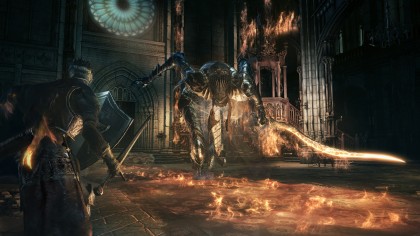
"It's a very stripped back engagement, down to just sword vs sword with a very aggressive enemy. It felt like it was a real test of the base skills of the game with no extra stuff added in, just raw combat."
But even in battles that are purely focused on combat, the trick is not to hit hard, but hit smart. Every boss battle is a puzzle, and though the swords and crossbows and laser guns do a lot of the work, brain is always more valuable than brawn.
"A lot of bosses can be thought of as a puzzle," Foster explains. "What tools do I have available in my inventory to beat this boss with? Is there anything in this environment that draws my eye and could be potentially used to help me?"
Brains vs. Brawn and reaping rewards from tough fights
It's this challenge that makes Zelda bosses so fascinating.
The ones in Wind Waker require specific weapons or tools that you don't always use to damage the boss directly - you're more likely to use a grappling hook to pull the tail of an overhead dragon, causing part of the ceiling to fall down onto the boss' head and exposing his weak point for a few crucial seconds.
Innovation makes for memorable fights – you can't attack the boss directly, so you have to figure out a way to manipulate the environment using what you've got in your pockets.
But it's not just the thrill of a challenge that keeps us motivated to fight and win. The boss battle is a final exam, a way to measure everything you've learned and make sure you understand the new mechanics before booting you out into the overworld again.
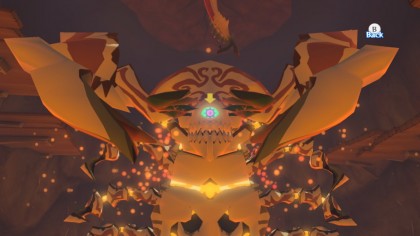
"By the time [the player] gets to a boss they should be well equipped to take on a larger challenge, and really put their new skills to the test," says Lockwood. "The player will then re-enter the world feeling more powerful and useful than before."
This ties into another important part of video games – the power fantasy. Even in a game like Shadow of the Colossus, where you are a teeny weeny dude in a world populated with titanic stone monsters, you still have the power to take them down with enough persistence and skill.
"I like a boss fight to be a challenge," says Foster. "[It should] feel like the player is overcoming a serious obstacle, usually a spike in difficulty compared to the previous part."
A good boss fight leaves the player with a sense of achievement, increased confidence and the drive to go on to what comes next – which is a tricky thing to achieve. You want a boss to feel climactic, but not so climactic that everything after feels like an epilogue.
The perfect boss battle is the canapé of game design: a delicious, self-contained experience that whets your appetite for something else. On the same sort of theme, Lockwood suggests that a boss battle can feel like a celebration: "It's as simple as being a special event during the game," he says. "Who doesn't like a party?"
Boss battles: the good and the bad
I have to say, I'm starting to question my own approach to boss battles at this point. I enjoy a good challenge, I'm just not a fan of combat that quickly sinks into repetitive button-mashing.
But I love Zelda, and I love puzzles, and I really, really love poking bosses in their big, red, inflamed eye-holes. Coming at bosses from a more analytical viewpoint might be the way forward.
"It's entirely about control," says Mark. "Understanding the fight entirely to the point where you can survive and hit the target in the kill window."
It's this tactical, thoughtful approach to boss battles that I hadn't considered. To me, they're more like awkward and drawn-out obstacles that I have to overcome to get back to the story.
Boss battles aren't hurdles, they're part of the racetrack
But perhaps, instead, they're part of the story – part of my story, as the protagonist who has to go through the Hero's Journey before I can face whatever the final challenge is. Boss battles aren't hurdles, they're part of the racetrack.
Of course, badly designed boss battles do exist, and they can let down an entire game by being anti-climactic or at odds with the game's overall message or style.
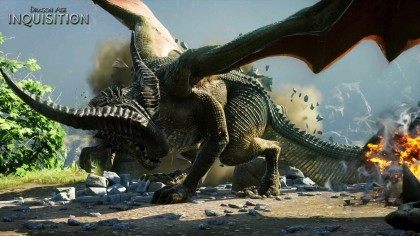
The final boss in Dragon Age: Inquisition was, for me, one of these, finishing a game about nuanced approaches to issues and political tightrope walking with a JRPG-style boss with a billion hit points and irritating area of effect attacks. It's hard to enjoy a fight that's so one-sided and long, and sometimes it's a shame that games with well-crafted narratives still feel it necessary to shoehorn in a big ol' boss fight at the end, often to their detriment.
DA:I aside, I'm left thinking about bosses that I've enjoyed in the past. There's a beautiful quartet of bosses in Majora's Mask that aren't just separate entities that serve as combat-based filler – they're vital to the game's story and message.
In Majora's Mask, you become different people through the use of magical masks, and each boss is designed to help you understand and come to terms with your different forms.
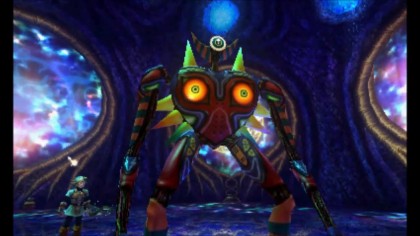
It's a game primarily about loss, and when it comes to the masks, it's about loss of your self – the player and the protagonist are both used to being Link, the kid with the sword, and when they're placed in the shoes of a Deku Scrub or a Goron, they're uncomfortable in their new skin. The bosses guide you through your new powers, and it takes perfect control of each one to succeed. Once you've done that, you get to go out into the world with fresh confidence in your new abilities.
That testing of comprehension is fundamental to a good boss battle.
"The act of fighting the boss should be a process of mastery," says Foster, "where you're constantly learning their patterns, adapting to timings, and generally becoming better at the game and the fight as it goes on."
Born to lose; Play to win
So what's the difference between a good boss battle and a great one?
According to Foster, "[It's] the way it makes a player feel."
A good boss battle should be well-paced, challenging, intense, and ultimately rewarding – but a great boss battle is something harder to achieve, something that requires just the right amount of tension and a gorgeous soundtrack to accompany it all.
A great boss battle is something that sinks its hooks into your heart and head, that balances story aspects along with enough of a test of your abilities that you're engrossed in the fight.
But if the best boss battles are the ones moving away from the traditional boss battle formula, then perhaps the next step is a revolt against boss battles altogether
A great boss battle is innovative and unexpected – it will subvert what you think you know, and that's what keeps you on your toes.
But if the best boss battles are the ones moving away from the traditional boss battle formula, then perhaps the next step is a revolt against boss battles altogether.
We're already seeing games become more like older media, such as TV and film, with episodic formats and increasingly cinematic level design. Maybe the next great boss battle won't just subvert what we expect – it won't be a boss battle at all.